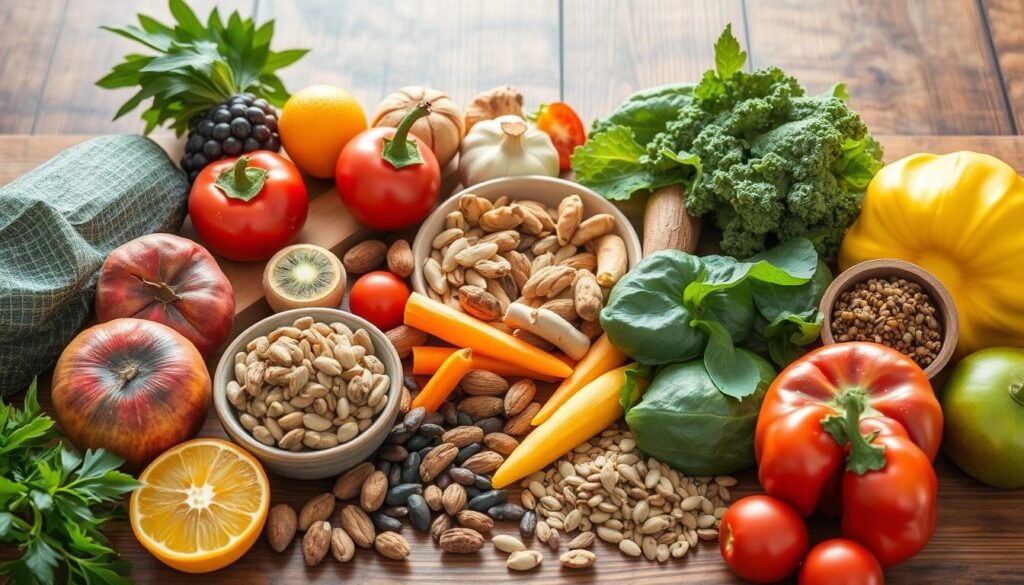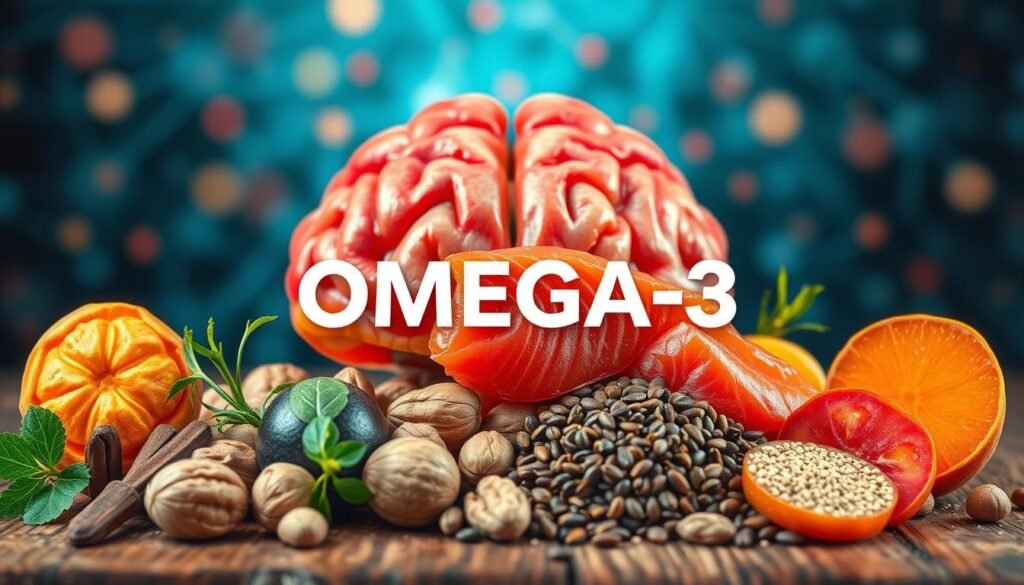Have you ever thought about how what you eat can improve your mood? The link between foods for brain health in depression and your mental health is strong. People often miss this. Although no diet can cure depression, eating natural foods helps. We will look at how foods rich in nutrients support mental health and fight depression.
Certain vitamins and minerals are vital for brain function. These include vitamin C, B vitamins, magnesium, and zinc. Foods like fruits, veggies, whole grains, and beans are great because they have complex carbs. These keep your brain running well. Also, studies show omega-3 and omega-6 fatty acids are important. Foods with these fats, like salmon, walnuts, and green veggies, are good for your brain.
Eating foods full of nutrients can make you mentally stronger. It’s crucial to avoid processed and sugary foods. They can make mental health worse. By choosing healthier food, you help your brain. This makes it easier to deal with depression.
Key Takeaways
- Natural foods rich in antioxidants and omega-3s support brain health.
- Essential vitamins and minerals play a pivotal role in mental well-being.
- A balanced diet with complex carbs is crucial for optimal brain function.
- Regular hydration is key to preventing mental health issues.
- Limiting processed sugars can help alleviate symptoms of depression.
Understanding the Connection Between Diet and Depression
There’s growing interest in how diet and depression are connected. Studies show that what we eat greatly affects our mental health. Eating a diet full of nutrients can help manage depression.
Eating lots of fruits, vegetables, nuts, and legumes, like the Mediterranean diet suggests, can lower depression risk. This diet also suggests eating some poultry and dairy but not much red meat. Whole foods are better for your mood than refined sugars and carbs.
Eating foods high in calories and saturated fats can trigger immune responses linked to depression. This shows how our food choices can change our emotional health. People with depression might eat more foods that cause inflammation, like trans fats and sugars, making things worse.
Changing what you eat can also change your gut health, which impacts your mental health. Our gut helps make serotonin, a chemical that makes us feel good. Poor gut health is linked to depression.
Getting nutritional counseling has helped over 32% of people feel better from serious depression. This shows how important good nutrition is for our mental health.
| Dietary Pattern | Impact on Depression |
|---|---|
| Mediterranean Diet | Reduced risk of depression |
| High Glycaemic Index Diet | Increased depressive symptoms |
| Caloric and Saturated Fat-Dense Diet | Potentially increases depression risk |
| Anti-inflammatory Foods | May reduce depressive symptoms |
| Omega-3 Fatty Acids | Possible preventive effect on depression |
The Role of Nutrients in Mental Wellness
Nutrients are key to mental wellness, especially for mood. Eating foods full of vitamins, minerals, and fatty acids helps a lot. For example, omega-3 fatty acids keep brain cells healthy and communicate well. Not having enough omega-3s can lead to mood issues, like depression or anxiety. They also fight inflammation, which is linked to some chronic conditions.
B vitamins play a big part in mental health too. They’re needed to make brain chemicals. Being low in these vitamins can up the risk of depression and dementia. Magnesium, known as the “relaxation mineral,” eases the nervous system. It helps control stress and anxiety. Not having enough can negatively affect your brain.
Eating complex carbs is good for your mental health. They slowly release glucose, essential for the brain. They also help make serotonin, which boosts happiness. Foods with probiotics affect neurotransmitters like serotonin and dopamine. These chemicals are crucial for feeling stable.
A diet full of nutrients for mental wellness lowers the chance of mental health issues. Following a Mediterranean diet is suggested. It has many vitamins and minerals for the brain. Knowing the link between food and mental health shows how important nutrition is.

Essential Omega-3 Fatty Acids for Brain Health
Omega-3 fatty acids are key for good brain health and help fight depression. Our body can’t make these fats, so we need to get them from what we eat or supplements. Let’s dive into sources of omega-3s and how they benefit our brain.
Sources of Omega-3s
Eating foods rich in omega-3s supports mental health. Here’s where you can find them:
- Fatty Fish: Salmon, mackerel, sardines, and tuna are top picks for EPA and DHA.
- Flaxseed: Ground flaxseed gives you ALA, which turns into EPA and DHA in your body.
- Walnuts: Packed with ALA, making them a great option for plant-based omega-3.
- Canola Oil: This common oil is also a source of ALA.

Benefits of Omega-3s in Depression
The connection between omega-3 fatty acids and mental health is strong. Studies show low DHA levels might speed up brain aging. Also, older adults taking 900 mg of DHA daily for 24 weeks saw better memory and learning.
Omega-3s can improve mood and lessen depression. Fish oil supplements might work as well as antidepressants, especially with more EPA. Pregnant women who take omega-3s have babies with higher intelligence scores. This shows the powerful effects of these fatty acids.
Even though results can vary, the benefits of omega-3s are undeniable. Western diets are moving towards more omega-6s than omega-3s, leading to more depression. Keeping a balanced intake is crucial for both overall and brain health.
| Source of Omega-3 | Type of Omega-3 | Servings for Recommended Intake |
|---|---|---|
| Fatty Fish | DHA and EPA | 2 servings per week |
| Flaxseed | ALA | 1-2 tablespoons daily |
| Walnuts | ALA | 1 ounce daily |
| Canola Oil | ALA | Use as cooking oil |
Foods Rich in Antioxidants and Their Impact
Antioxidants are key in enhancing mental health. They fight oxidative stress and cut cellular damage. This leads to better mental health. Knowing about different antioxidants can help choose the best fruits and vegetables. Adding these foods to your diet can improve health, especially for those with mood disorders.
Types of Antioxidants
There are many antioxidants that support brain health. Notable examples include:
- Vitamin C: Found in fruits and veggies like oranges and strawberries.
- Vitamin E: Protects cells and is found in nuts and seeds.
- Beta-carotene: Turns into vitamin A and is in colorful vegetables like carrots and sweet potatoes.
These nutrients help lessen the risk of mood disorders and boost mental clarity.
Fruits and Vegetables High in Antioxidants
Eating lots of fruits and veggies can up your antioxidant intake. This benefits your mental health. Look at this table for the best sources:
| Fruit/Vegetable | Main Antioxidants | Health Impact |
|---|---|---|
| Blueberries | Vitamin C, Vitamin E, Anthocyanins | May boost memory and brain function |
| Broccoli | Vitamins C, E, and K | Helps immune and brain health |
| Spinach | Beta-carotene, Vitamin C | Lessens brain oxidative stress |
| Carrots | Beta-carotene | Could aid eye and brain health |
| Strawberries | Vitamin C, Anthocyanins | May better mood and mental well-being |
Eating various fruits and veggies boosts diet quality and health. Focusing on these foods might improve mental health naturally. For more info on how nutrition affects mental health, see eating for mental health.

B Vitamins and Their Influence on Mood
B vitamins are key for a healthy mind. They focus on folate and vitamin B12. These help create neurotransmitters, which boost mood and keep emotions steady. Not having enough can raise the risk of depression and affect thinking, showing how crucial they are.
Importance of Folate
Folate, or vitamin B9, is essential for brain health. It’s needed to make neurotransmitters that manage mood. Adults need 400 µg of folate daily, but not more than 1000 µg to avoid harm. Eating foods like beans, leafy veggies, and cereals with added vitamins helps prevent mood problems and thinking issues.
Vitamin B12 and Its Role in Depression
Vitamin B12, or cobalamin, is vital for mental health. It helps nerves work and makes DNA and red blood cells. Not getting enough B12 can cause nerve problems and mood swings. This is often seen in vegetarians and older people. Eating fish, dairy, and foods with added B12 can help. For those worried about their B12 levels, this resource might be useful to learn about its role in fighting depression.
| Vitamin | Recommended Daily Allowance | Food Sources | Impact of Deficiency |
|---|---|---|---|
| Folate (B9) | 400 µg | Legumes, leafy greens, fortified cereals | Megaloblastic anemia, cognitive impairment |
| Vitamin B12 | 2.4 µg | Fish, dairy products, fortified foods | Nerve damage, mood changes |
| Vitamin B6 | 1.3 mg | Poultry, fish, potatoes | Anemia, irritability, cognitive decline |
| Niacin (B3) | 16 mg (Men), 14 mg (Women) | Meat, fish, legumes | Pellagra: dermatitis, weakness |
The Power of Magnesium and Zinc
Magnesium and zinc play big roles in our mental health. They offer benefits that reach beyond just physical well-being. Addressing shortages in these minerals can make our mood better and boost mental health. Around one billion people face mental illness globally. The importance of these minerals is huge.
Magnesium’s Role in Mood Regulation
Magnesium is key for our brain function and keeping our mood stable. It helps nerves communicate and is part of building cell membranes. Lack of magnesium may cause mood problems, like depression and anxiety. Foods rich in magnesium, like nuts and greens, can lower anxiety and help us sleep better.
Adding these to our diet regularly helps our mood. Our gut health, affecting 90% of serotonin receptors, depends on our diet. A diet high in fiber supports good bacteria. This helps lessen inflammation that can affect mood.
How Zinc Affects Mental Health
Zinc is important for mood and brain function. Not having enough zinc can worsen anxiety and depression. It can slow down recovery. Foods like shellfish and seeds are great sources of zinc. Zinc helps our brain send signals and fights off illness. For those who don’t get better with usual treatments, adding zinc might help.
There is a strong link between zinc levels and mental wellness. Keeping an eye on zinc intake is crucial. Research shows zinc and magnesium can fight depression. For more info, look into studies like this one that explore their benefits for depression.
| Mineral | Role in Mood Regulation | Sources |
|---|---|---|
| Magnesium | Facilitates nerve transmission and stabilizes mood | Nuts, seeds, leafy greens |
| Zinc | Affects neurotransmitter function and cognitive capabilities | Shellfish, legumes, seeds |
Probiotics and Gut Health: A Surprising Link to Mood
Recent years have shown us that gut health affects our mental well-being. This is all about the gut-brain connection. Essentially, the state of our gut can change how we feel and think. Scientists have found that issues in our gut can lead to anxiety and depression. This makes probiotics key for keeping our gut healthy.
Understanding the Gut-Brain Connection
The link between our gut and brain is critical for our mood. Research shows that people with gut problems often face mental health challenges too. This includes conditions like depression and anxiety. An imbalance in gut bacteria can worsen these problems. In fact, some gut bacteria types are directly linked to depression. A study by UCLA found that women taking probiotics had better brain function related to emotions. This proves that a healthy gut can positively affect the brain.
Foods Rich in Probiotics
Adding probiotics to our diet helps with gut health and mood management. Some of the best probiotic sources are:
- Yogurt: Well-known for its live cultures.
- Kefir: A fermented dairy drink full of good bacteria.
- Kimchi: A probiotic-packed fermented vegetable.
- Sauerkraut: Fermented cabbage that aids digestion.
- Miso: A fermented soy product that improves gut health.
Eating these probiotic-rich foods helps balance our gut bacteria. This may lead to a happier mood and fewer depression symptoms. Good gut bacteria increase serotonin production, vital for mood regulation. Combining probiotics with traditional treatments may offer a comprehensive approach to mental health care. For more tips on dealing with depression-related low energy, check out this resource.
The Benefits of Flavonoids for Brain Health
Flavonoids are found in many plants, like fruits, veggies, teas, and dark chocolate. They’re known for their benefits to brain health. Flavones, a type of flavonoid, are especially plentiful and good for the brain. These compounds help protect nerve cells. They keep the brain working well and fight off mood problems.
Which Foods Are Rich in Flavonoids?
Eating foods rich in flavonoids is easy and good for you. Blueberries and blackberries are packed with these compounds. Citrus fruits and grapes are also great sources. Onions and kale have a lot of flavonoids too. Drinks like green tea and red wine are tasty and full of flavonoids. Eating these foods often can help your brain stay healthy.
The Positive Effects of Flavonoids on Mood
Studies show flavonoids can help make you feel better and might even fight depression. One big study found eating foods with flavonoids can lower the risk of dementia. This is especially true for people with genetic risks or who feel down. Since depression might lead to other health issues by 2030, flavonoids could help. Eating flavonoid-rich foods might be a good way to keep your brain and mood in good shape.